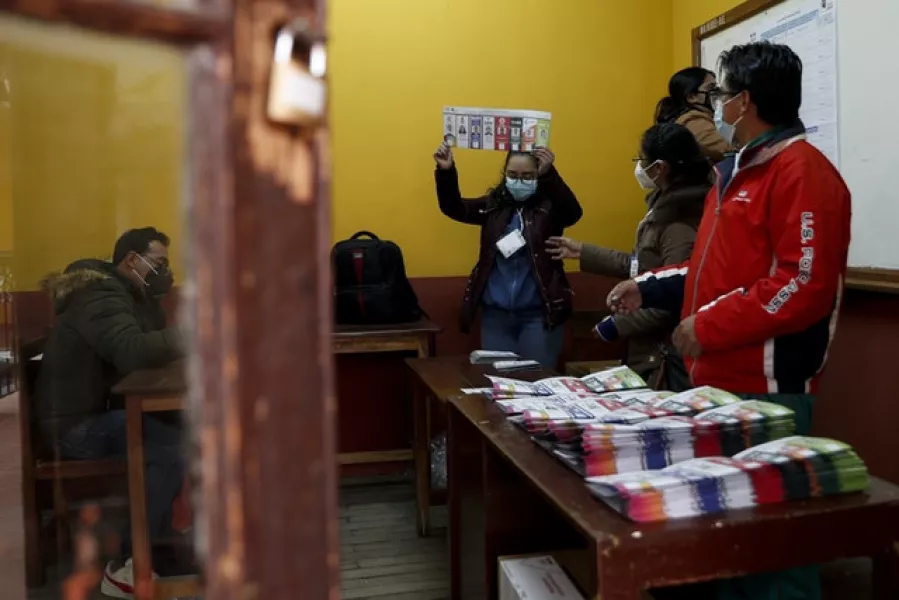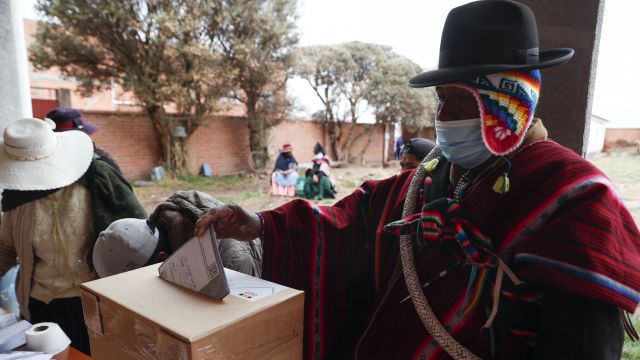The vote is meant to put an end to political turmoil following last year’s annulled ballot that resulted in leftist President Evo Morales’ resignation.
Six hours after polls closed, barely 3% of all ballot boxes had been counted, officials said. Adding to intrigue, publication of two exit polls were withheld after private pollsters said they did not trust their own survey results.
Bolivians have long been accustomed to quick preliminary results in presidential elections.

But after allegations of fraud and violent protests marred last year’s ballot, newly installed electoral authorities have been appealing for patience, reminding voters that they have up to five days to declare a winner.
“These are days that require maturity from each and every one of us,” interim President Jeanine Anez said shortly after polls closed following a peaceful, mostly incident-free day of voting.
Bolivia, once one of the most politically volatile countries in Latin America, experienced a rare period of stability under Mr Morales, the country’s first Indigenous president who resigned and fled the country late last year after his claimed election win was annulled amid allegations of fraud.
Protests over last year’s vote and later his ouster set off a period of unrest that caused at least 36 deaths. Mr Morales called his ouster a coup and a non-elected conservative government has ruled ever since.
Sunday’s vote is an attempt to reset Bolivia’s democracy. All seats in the 136-member Legislative Assembly were also being elected.
Bolivia’s new executive and legislative leaders will face daunting challenges in a polarised country, ravaged by Covid-19, and hampered by endemically weak institutions
“Bolivia’s new executive and legislative leaders will face daunting challenges in a polarised country, ravaged by Covid-19, and hampered by endemically weak institutions,” said the Washington Office on Latin America, a Washington-based human rights advocacy organisation.
Voting appeared to be peaceful, with long lines at some polling places but little of the hustle and bustle of past election days. Voters appeared to be wearing masks and following physical distancing restrictions.
But it may be days before Bolivians have a good idea who won. The country’s Supreme Electoral Court announced late on Saturday that it had decided unanimously against reporting preliminary vote totals as ballots are counted.
The court said it wanted to rely on the slower official count and avoid the uncertainty that fed unrest when there was a long halt in reporting preliminary results during last year’s election.

The early results reported late on Sunday favoured former President Carlos Mesa, the strongest of a number of conservative candidates trying to prevent a return of socialist rule.
With less than 3% of ballot boxes counted, Mr Mesa, a former journalist and historian, had 56% and former Morales Economy Minister Luis Arce was second at 33%.
Mr Morales, who was barred from running, issued a statement from his refuge in Argentina urging his backers not to be provoked into violence, urging them to patiently wait for the results.
“The great lesson we should never forget is that violence only generates violence, and with that, we all lose,” he said.
The election was postponed twice because of the coronavirus pandemic.







